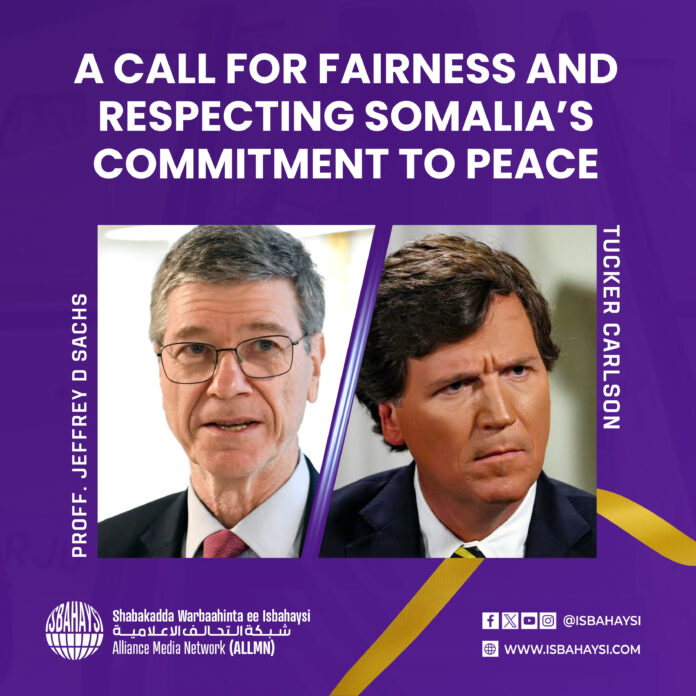In light of Professor Jeffrey Sachs’ recent interview with Tucker Carlson, which brought to light a troubling revelation from Benjamin Netanyahu’s memoir, in which he allegedly grouped Somalia alongside Iraq, Libya, Lebanon and Iran, among others, as targets for destruction, I, as a Somali citizen, am compelled to respond this unwarranted narrative as well as the Jeffrey’s subsequent comments about Somalia as none-existent – these narrative and comments are deeply disheartening and worryingly dangerous. A small nation with almost no military, economic power and political capacity to threaten Israel, Somalia finds Netanyahu’s plot unjustifiable. This is, without a shred of doubt a grave misrepresentation of Somalia’s history, its people, and its current geopolitical realities.
For Jeffery’s comments about Somalia as non-existent, I firmly believe that a prominent scholar, such as Professor Jeffrey Sachs should understand the importance of respecting other people’s feelings and therefore refrain from any spiteful comments to other nations/peoples. For your information Prof, Somalia’s identity as a nation predates the modern concept of the nation-state in 1648, making it a fascinating case in historical and cultural studies for scholars like you. As a nation, Somalia embodies a unique blend of ancient civilization, cultural continuity and historical influence that reaches back thousands of years. Therefore, no hardship can destroy our nationhood as it is rooted in resilience, unity and an unyielding spirit that transcends adversity.
For Netanyahu, though, the logic of his assertion for targeting destruction on a small nation striving to rebuild itself from decades of conflict demands scrutiny. Netanyahu’s inclusion of Somalia in a list of nations allegedly threatening Israel defies historical and political logic. Somalia currently has neither the military capacity nor the political inclination to challenge Israel. Somalia’s focus has, for decades, been and still is inward looking to address the unprecedented challenges it faces including state-building.
To begin with, Somalia’s interaction with the state of Israel has been negligeable. Notably, historical records reveal that Israel voted in favour of Somalia’s independence at the United Nations in 1960. This was a gesture of support that many Somalis still remember today and really appreciate – however, this act of solidarity contrasts starkly with the assertions in Netanyahu’s memoir to add Somalia the alleged list of countries targeted for destruction.
No doubt, Somalia has consistently upheld its principles in international diplomacy, advocating for justice and peace all over the world, including in its support for the Palestinian cause. This is principle that is rooted in Somalia’s commitment to human rights, which no one should misconstrue as hostility toward Israel or any other nation. Unfortunately, Netanyahu’s inclusion of Somalia in the list of countries allegedly targeted for destruction seems to stem from his personal worldview that paints entire nation as threats based on ideological or religious affiliations rather than actual actions. Grouping Somalia with nations like Iraq, Libya, and Iran, which are countries with massively different histories, capacities, and geopolitical ambitions and dynamics is not only inaccurate but also harmful to a nation struggling to recover from a brutal civil war.
The rise of local extremist groups such as Al-Shabaab has been a source of death and destruction for Somalia itself, not a tool for projecting hostility abroad, therefore, it is inconsiderate to use Al-Shabaab as an excuse to harm a whole nation struggling its own overwhelming challenges including fight against terrorism. Linking Somalia to broader ideological struggles between big and middle powers does a huge damage to its people, who are striving for peace, stability, and development. Such unfounded accusations carry real consequences to the peaceful aspirations of the Somali people as it perpetuates narratives that hinder Somalia’s recovery, damaging its reputation and reinforcing stereotypes that portray the Somali people as aggressors rather than victims of decades of conflict and terrorism. At a time when Somalia seeks to reengage with the international community and attract partnerships for development, these baseless assertions undermine those efforts. Somalia’s struggles are not Israel’s nor any other nation’s responsibility and to unfairly implicate Somalia in a narrative of hostility is unjust and counterproductive therefore it is the time to set the record straight. What Somalia needs is support, understanding and partnership but not unjustified accusations. We understand that global security is a shared responsibility and that nations must take concerns seriously. However, associating Somalia with unjustified accusation does not reflect current/historical realities nor Somalia’s unwavering commitment to peaceful coexistence and respect for all nations. We therefore should urge all world leaders and other stakeholders to reconsider any unfounded narrative(s) that implicates Somalia without reason. Let us move forward together in the spirit of mutual respect, cooperation and a shared commitment to peace.
This is the moment to offer an opportunity for reflection, instead of perpetuating narratives of hostility, therefore the international community should focus on building bridges of understanding – Somalia’s story is one of resilience and hope and it is time the world recognized it as such.
Author: Mr. Balal Mohamed Cusman, Former State Minister for Foreign Affairs and International Development of Somalia. Email: [email protected]. X: @BalalCusman



